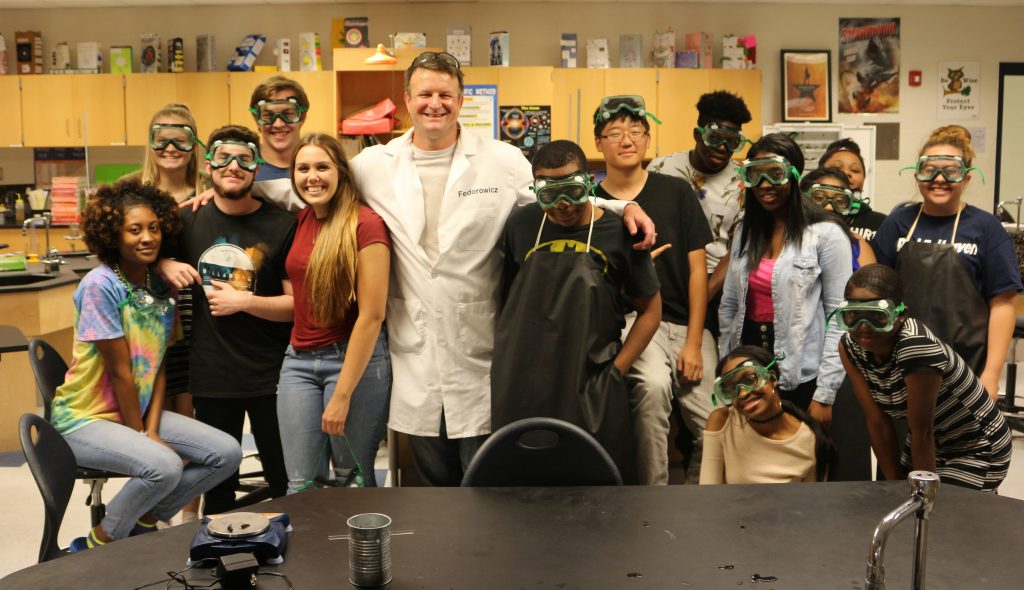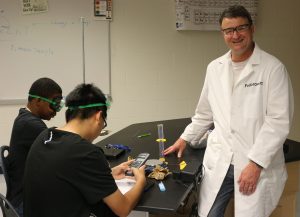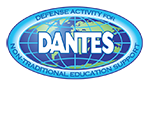April
2018
Navy Intelligence to Chemistry Teacher
The biggest benefit to teaching is knowing that you have a direct impact in helping prepare your students to succeed in life beyond the classroom.

John A. Fedorowicz, U.S. Navy (Retired) ⇒ Served 25 years from 1988 – 2013
Today, he proudly teaches chemistry at Indian River High School, Chesapeake, VA
"I knew I wanted to teach, so I worked with Troops to Teachers to come up with a strategy wherein I could quickly transition into the teaching world with minimal lag time following my Navy career." ~ J. Fedorowicz
Troops to Teachers (TTT) Participant Spotlight
Q. What led to your decision to teach?
A. During my second tour, I was assigned to the Navy and Marine Corps Intelligence Training Center (NMITC). I was initially assigned as the Curriculum/Instructional Standards Officer (CISO). After a year, I also began teaching intelligence-related subjects involving operational intelligence. During this time, I realized I enjoyed figuring out how to put together information on a topic and how to best explain it to students. I enjoyed the challenge of making topics relevant and interesting to students. As an intelligence officer, I was accustomed to speaking in front of groups and conveying information quickly and accurately as well as responding to questions. I enjoyed every aspect of the job so much that it began to be part of my post Navy plans at an early stage.
Q. How did you learn about TTT?
A. I learned about TTT toward the end of my career, while stationed at Fleet Forces Command in Norfolk. I had already earned my Master of Education from Troy State University at that point, using the Navy’s Tuition Assistance (TA) program. TTT provided a great resource, especially as I started to look at what would be required for me to successfully transition to this new challenge after leaving the Navy.

Q. What was your experience working with TTT?
A. My experience with TTT was great. I worked with a program representative who immediately instilled the confidence in me that I could successfully transition and that I would have a lot to offer. He was easy to reach, very knowledgeable on the entire program, and even followed up with me to make sure I had not hit any roadblocks during the transition.
Q. How did the program help you secure a job teaching?
A. TTT helped educate me on how and where to look to find employment. My rep also explained and helped locate schools in need that were looking for a science/chemistry teacher. Being a complete neophyte to the education system, from a teacher’s side this time, his insight was invaluable in guiding me in the right direction to help locate the schools that would fit the TTT requirement while being close to our home. It was like helping put the pieces of the puzzle together in this whole new world for me.
Q. What is the biggest benefit of teaching?

A. The biggest benefit to teaching is knowing that you have a direct impact in helping prepare your students to succeed in life beyond the classroom. The impact may come in the form of conveying information, as in my subject of chemistry. It may be in listening to them and maybe providing advice when they have had a bad experience at work, home, or with their peers. It may also be in modeling patience, self-control, organization, or how to treat others with respect. The impact teachers have on students’ lives can never be overestimated.
Q. What is your advice for other military members looking to pursue a teaching career through TTT?
A. I would advise patience. I would also say that you can absolutely do it! Military members have all the skills needed to be successful. From early on, the military teaches discipline, time management, persistence, and determination. However, you will not become an expert in teaching quickly. There is much more to it than you realize at first. Schools are run differently than military commands. The chain of command is not as clear cut at times, which can be frustrating, especially when you have been part of a well-run command.
Q. What are your long term teaching goals?
A. As this is only my third year of teaching, I am trying to figure that out. I like being “in the trenches” with the kids teaching science. I think when they know that I have a little more experience, they actually enjoy it too! I am still learning about the other jobs in the field of education, wherein I can apply my military experiences. Being retired affords me opportunities and advantages that some of my younger colleagues do not have. I can take my time to see where I can have the greatest impact. Right now, I just want to continue learning how to use the vast amount of tools available to become the best teacher I can be.
"Teaching after serving in the military is important because it allowed me to continue to contribute and fully utilize my military background to help bring success to both my students and my school. My military experience immediately put me in the minority, which makes it much more valuable to students (or even fellow teachers) who may have never met a veteran. I can answer many general questions about the Navy or military. I can also empathize with kids whose parents are deployed while also providing advice on military careers."" ~ J. Fedorowicz
More Information
Troops to Teachers is a Department of Defense program designed to help Service members transition from military service to civilian employment successfully. The mission of the TTT program is to help put you in the classroom as a teacher by providing counseling services, employment facilitation services and financial assistance, if you are eligible. The program website is located at www.proudtoserveagain.com and you can apply anytime. There is no commitment to apply or cost to participate in the program. You decide where you want to teach. It’s best to apply sooner rather than later, but definitely before leaving the military.

